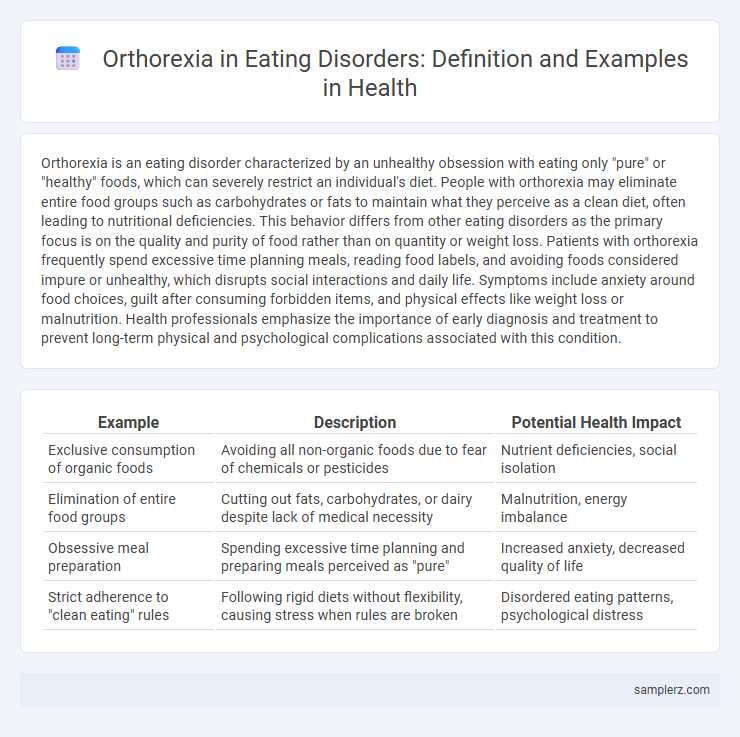Orthorexia is an eating disorder characterized by an unhealthy obsession with eating only "pure" or "healthy" foods, which can severely restrict an individual's diet. People with orthorexia may eliminate entire food groups such as carbohydrates or fats to maintain what they perceive as a clean diet, often leading to nutritional deficiencies. This behavior differs from other eating disorders as the primary focus is on the quality and purity of food rather than on quantity or weight loss. Patients with orthorexia frequently spend excessive time planning meals, reading food labels, and avoiding foods considered impure or unhealthy, which disrupts social interactions and daily life. Symptoms include anxiety around food choices, guilt after consuming forbidden items, and physical effects like weight loss or malnutrition. Health professionals emphasize the importance of early diagnosis and treatment to prevent long-term physical and psychological complications associated with this condition.
Table of Comparison
| Example | Description | Potential Health Impact |
|---|---|---|
| Exclusive consumption of organic foods | Avoiding all non-organic foods due to fear of chemicals or pesticides | Nutrient deficiencies, social isolation |
| Elimination of entire food groups | Cutting out fats, carbohydrates, or dairy despite lack of medical necessity | Malnutrition, energy imbalance |
| Obsessive meal preparation | Spending excessive time planning and preparing meals perceived as "pure" | Increased anxiety, decreased quality of life |
| Strict adherence to "clean eating" rules | Following rigid diets without flexibility, causing stress when rules are broken | Disordered eating patterns, psychological distress |
Understanding Orthorexia: A Closer Look at Healthy Eating Obsession
Orthorexia nervosa manifests as an unhealthy obsession with consuming only "pure" or "clean" foods, often leading to nutritional deficiencies and social isolation. Individuals with orthorexia meticulously avoid foods perceived as unhealthy, which can escalate into restrictive eating patterns resembling other eating disorders. Recognizing orthorexia requires understanding its impact on mental and physical health beyond surface-level healthy eating habits.
Key Signs and Symptoms of Orthorexia
Orthorexia is characterized by an obsession with eating foods perceived as healthy, leading to restrictive diets and nutritional deficiencies. Key signs include extreme anxiety about food quality, compulsive checking of ingredient lists, and social isolation due to dietary restrictions. Physical symptoms may involve unintended weight loss, fatigue, and gastrointestinal issues resulting from inadequate nutrient intake.
Real-Life Examples of Orthorexia in Everyday Life
Orthorexia, characterized by an obsession with healthy eating, often manifests in real-life scenarios such as individuals eliminating entire food groups like fats or carbohydrates despite nutritional needs. Patients may fixate on organic or "clean" foods, leading to social isolation and malnutrition due to overly restrictive diets. Cases include athletes or fitness enthusiasts who severely limit their intake to optimize performance, ultimately compromising both physical health and mental well-being.
Distinguishing Orthorexia from Other Eating Disorders
Orthorexia nervosa is characterized by an obsessive focus on healthy eating, differentiating it from anorexia nervosa and bulimia nervosa, which primarily involve concerns about body weight and shape. Unlike anorexia, where calorie restriction aims for weight loss, orthorexia centers on food purity and quality rather than quantity or appearance. This fixation on "clean eating" often leads to nutritional deficiencies and social isolation despite appearing as a health-conscious behavior.
Psychological Drivers Behind Orthorexia
Orthorexia nervosa, characterized by an obsessive focus on eating healthy or "pure" foods, often stems from psychological drivers such as perfectionism and anxiety about health. Individuals with orthorexia may experience intense fear of illness or contamination, leading to restrictive eating patterns that impair social functioning and overall well-being. These underlying cognitive distortions highlight the complex interaction between mental health and disordered eating behaviors.
Social Media’s Role in Promoting Orthorexic Behaviors
Social media platforms often amplify orthorexic behaviors by glorifying restrictive diets and idealizing "clean eating" trends, which can lead to unhealthy obsessions with food purity. Influencers and hashtags promoting extreme health-conscious lifestyles may inadvertently encourage followers to develop rigid eating patterns characteristic of orthorexia. Exposure to curated content emphasizing perfection in nutrition increases the risk of orthorexia nervosa, a condition marked by anxiety and compulsive avoidance of foods perceived as unhealthy.
Health Consequences of Orthorexia: Beyond Nutrition
Orthorexia, an eating disorder characterized by an obsession with healthy eating, can lead to severe psychological stress and social isolation. Individuals with orthorexia may experience nutrient deficiencies, causing fatigue, weakened immune function, and hormonal imbalances despite consuming ostensibly "healthy" foods. Long-term orthorexia disrupts overall well-being by impacting mental health, leading to anxiety, depression, and impaired quality of life.
Orthorexia in Different Age Groups and Communities
Orthorexia manifests uniquely across different age groups, with adolescents often exhibiting rigid dietary rules due to social influences, while older adults may develop orthorexic behaviors linked to health-related anxiety. In diverse communities, cultural dietary norms shape the expression of orthorexia, where some populations emphasize purity and natural foods, intensifying restrictive eating patterns. Recognizing these variations aids in developing age-appropriate and culturally sensitive interventions for orthorexia nervosa.
Recognizing Orthorexia: When Healthy Eating Becomes Harmful
Orthorexia is characterized by an obsessive focus on healthy eating that disrupts daily life and mental well-being, often leading to malnutrition despite intentions to improve health. Individuals may rigidly avoid entire food groups, experience intense anxiety over food purity, and isolate themselves socially due to their dietary restrictions. Recognizing orthorexia involves identifying these behaviors and understanding that an extreme fixation on "clean eating" can paradoxically harm physical and emotional health.
Strategies for Addressing and Treating Orthorexia
Effective strategies for addressing orthorexia include cognitive-behavioral therapy (CBT) to challenge obsessive thoughts about food purity and rigid dietary rules. Nutrition education with a registered dietitian helps restore balanced eating patterns and reduces anxiety related to food choices. Incorporating mindfulness practices supports emotional regulation and decreases compulsive behaviors associated with orthorexia.

example of orthorexia in eating disorder Infographic
 samplerz.com
samplerz.com